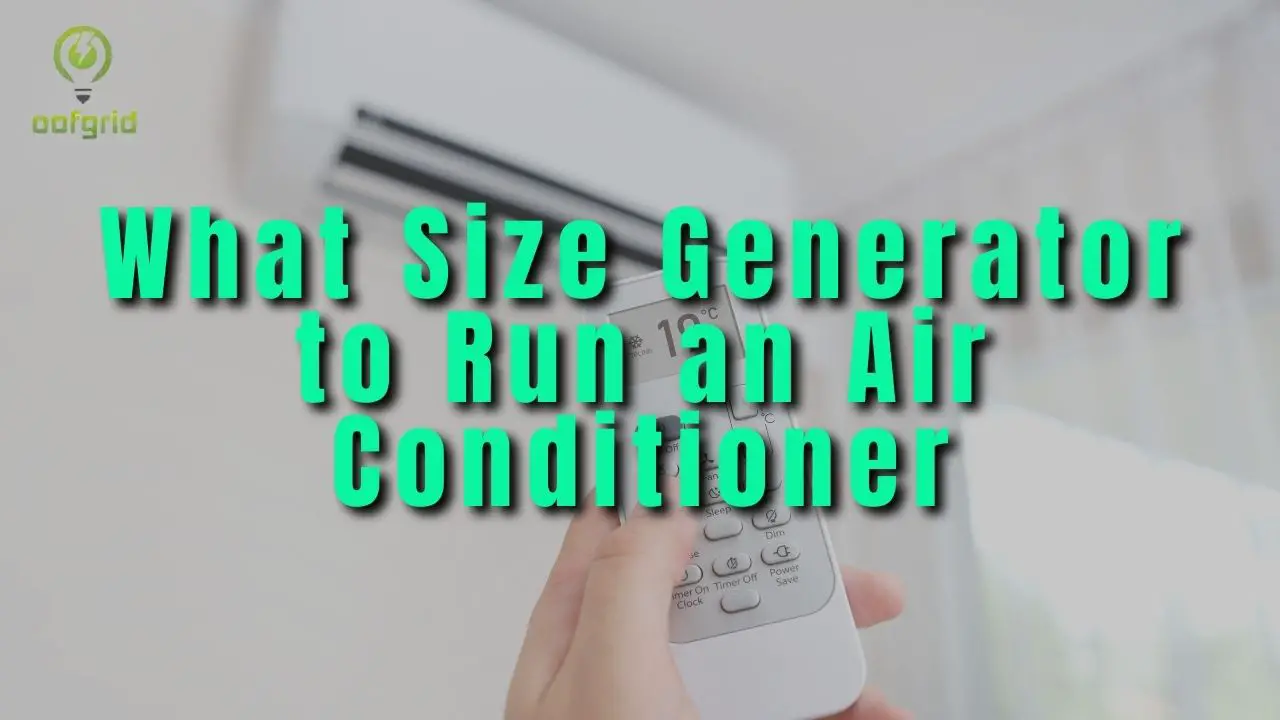Solar generators are a great green way to power your appliances off-grid. Solar generators also have the benefit of not requiring fuel to keep you powered.
Solar generators collect energy through solar panels and convert the DC power to AC power and store it in a battery bank to power your devices. Solar generators have the advantage of very quiet operation and do not rely on fuel to use.
Solar panels work by capturing energy produced by the sun, when the sun shines on the components of the panel the photons knock electrons out of the elements in the panel and it causes the flow of electrons which power your devices.
Solar panels are made up of multiple photovoltaic cells that are connected together and energy flows from cell to cell to the charge controller and into the battery to be stored for use.
Solar generators are really self-contained battery banks. They have all the same components of a household solar system in a portable form.
The solar panels collect energy from the sun and pass it to the generator box which contains a charge controller which controls the flow of energy, a battery to store the battery, and an inverter to make the energy usable.

These are the same components that you would find in any solar energy set up on or off-grid.
The benefit of a solar generator over gas or electric comes down to three main things:
- Environmental Impact
- Noise
- Fuel reliance
Consider your budget and your weather and if solar is an option, I think it will save you a lot of money over the life of your generator.
Contents
What are the pros and cons of solar generators?
When considering off-grid or backup power you may be wondering which would work best for your situation.
Solar Generators
| Pros | Cons |
| Do not rely on fuel | Higher upfront cost |
| Do not require oil changes | Require adequate sunlight |
| Quiet operation | Will not work at night |
| Less environmental impact | Limited outlet configuration |
Gas Generators
| Pros | Cons |
| Lower cost upfront | Require fuel to produce electricity |
| Many configurations available | Environmental impact |
| Replacement parts are easier to acquire | Requires regular maintenance and oil changes |
| Can last for many years | Noisy |
When deciding what off-grid power source is best for you, consider the weather conditions and the availability of fuel in your area.
Do Solar Generators Really Work?
Solar generators are a great choice because they work well and they are as powerful as gas or diesel generators without relying on fuel.
Solar generators are rated in watts just like traditional generators and you can select the size that meets your electrical needs. Solar generators will be more expensive per watt upfront, but you will not need to buy fuel to run the generator.
I think it makes more sense to go solar if we are talking about price. I was reading about sizing generators for air conditioners and one couple said it cost them $10 in fuel a day to run the AC! Gas prices are only rising, so the solar generator becomes cheaper pretty quickly.
What Can You Run On a Solar Generator?
All electrical appliances require a certain amount of electricity.
Solar generators are battery banks that collect and store energy for use to power your appliances, so you will need to do a bit more math than you would with a traditional generator.
Make A List
Make a list of everything you hope to run off the solar generator and collect the following information:
Voltage
Amps
Use the formula watts=amps x volts.
This formula will give you the watts that your appliance will use in an hour. Multiply that number times the number of hours you think you will use your appliance.
Keep these numbers handy so you can use those numbers to guide your power usage if you have an unexpected rainy day and you need to be more conservative with the power.
Common Appliance Power Use Per Day
The math required when generator shopping can be really overwhelming.
Once you have a list of things you hope to power with your generator use this list of averages to get a general idea of what your power needs are.
If you want to get really specific you can purchase a plug in electricity usage monitor. I am a math teacher, and I do not shy away from a complicated problem, but I think this is the easiest solution to get the real numbers you need to make the correct generator decision.
I find that many appliance labels do not list the surge power and you may find your generator trips when your AC kicks or the refrigerator compressor switches on.
So, grab the inexpensive monitor and keep a log of the power usage of each device.
These averages give you an idea of how much energy you can expect to pay for a day of typical use.
| Refrigerator | 1,000 to 2,000 watts |
| Window AC | 6,500 watts |
| Television | 300 watts |
| Stove and Oven | 3,000 watts |
| Washer | 250 watts per load |
| Dryer | 3,700 watts per 40 minute cycle |
You will likely use less energy when using off-grid power as you will be more aware and conservative of power use.
When you are looking at a solar generator they will tell you how much power the battery bank can store.
Calculate how many overnight hours you will be running appliances and make sure your battery bank can store that much energy.
If you have high draw appliances, try to run them during the day while your solar panels are charging the battery.
Consider Alternatives
If you cannot afford a very large solar generator you can use alternative fuels for some of your tasks.
Propane heat is very efficient and cost-effective. A grill-sized propane tank can run a propane heater for 24 continuous hours for larger units and even longer for smaller units.
Butane or propane camp stoves provide a lot of cook time and the fuel tanks are small and easy to grab at Walmart right off the shelf.
A cooler with ice or frozen food can stay cold for more than 24 hours. Even an affordable cooler can keep your food cold for a long time. Consider stocking up on nonperishables to keep the cooler needs to a minimum.
If you use a water heater, consider using a propane version so that you can save your electricity for charging electronics and keeping the light on.
If you will need to run many electric appliances, look for RV versions of water heaters, refrigerators, and electric furnaces. These will be more energy efficient as they are designed to be used away from the grid.
Finally, when we talk about laundry, plan to do less or to travel to the laundromat. I like the WonderWash manual washer to clean a few things at a time.
The more expensive apartment washer gets mixed reviews but is a much more viable option for families who will need to do regular washing. 300w for washing and 110w for drying makes it a light appliance.
Solar Generator vs. Gas Generator Cost Per Watt
So you may have some sticker shock when you start looking at solar generators, but remember that you will not be purchasing fuel to run the generator.
This chart compares a few of the most commonly recommended generators and their cost per watt.
| Gas Generators | Cost Per Watt | Fuel Cost? |
| Predator 3500 Watt Gas Generator | $0.257 | Yes |
| PowerSmart 1000 Watt Gas Generator | $0.196 | Yes |
| Honda EU2200i 2200 Watt Gas Generator | $0.513 | Yes |
| Hybrid Generators | ||
| DuroMax XP13000EH Dual Fuel 13000 Watts | $0.092 | Yes |
| Westinghouse WGen9500F Dual Fuel 9500 Watts | $0.11 | Yes |
| Champion Dual Fuel 7500 Watts | $0.153 | Yes |
| Solar Generator | ||
| Jackery 1500 1800 Watt Solar Generator | $1.61 | No |
| EF EcoFlow 1800 Watts | $0.61 | No |
| Bluetti EB55 700 Watts | $1.284 | No |
*Prices are based on 2022 available prices
** Solar generator prices include solar panels
You can see that you will be paying a lot more per watt for a solar generator, but remember that you will not pay for any fuel to run the generator!
If you only need a backup generator for emergencies or occasional use, a gas generator may be more affordable over the use of the generator, but be sure to perform regular maintenance and oil changes.
The cost of gas continues to rise and if you live in an area where downed trees often knock the lines down it is a real possibility that you will not be able to drive to get gas.
Our last power outage lasted over 36 hours and our roads were not passable. Our power banks kept our phones charged, kept the DVD player running for the kids, and allowed us to use the Hot Logic to warm up some food.
Can You Run a Solar Generator While Charging It?
Solar generators can be used when the solar panels are collecting energy. In full sunlight, the panels may keep batteries full while in use. Solar generators are designed to shut off power to the batteries when they are full, so using the batteries while they are charging will make the most of available sunlight.
There are two components in the solar generator that protect the batteries from being damaged while charging and being used.
The charge controller will allow energy to charge the batteries when they are not full. This device will turn off the power to protect the batteries from overcharging.
The inverter regulates the power as it powers your devices. This will keep the outgoing voltage at a constant rate.
Be careful to charge your generator during the day so that you have plenty of power to run fans or lights when the sun sets.
What Is the Most Powerful Generator?
There are solar generators that are capable of powering the vital appliances in the whole home.
The EF EcoFlow Delta Pro is commonly referred to as the most powerful solar generator. The Delta Pro is an expandable system that can be expanded to fit your needs. Delta Pro can also be charged in 2.5 hours from wall power and can even be charged at an electric car charging station.
Solar generators like the EcoFlow Delta Pro can be used in conjunction with traditional grid power to lower power bills or to make the switch to off-grid power a little at a time.
The battery bank components can be purchased and changed in the car, in the house or you can purchase solar panels to charge the device.
The panels offered by EcoFlow track the sun to improve the efficiency of the panels by up to 30%.
Should I Get A Solar Generator Or A Gas Generator?
If you have the budget and you have access to sunny days, you should get a solar generator. If you need constant heat, you should have a backup energy source as electric heat is very inefficient.
I recommend that you get an expandable solar generator if you can get the budget together. Expandable systems can meet your needs for many years and gives you incredible flexibility.
These systems are very similar in cost to non-expandable systems but offer so much more.
The EF EcoFlex system has so many ways to charge and so many ways to expand the system I find it a very impressive option. The sun-tracking solar panels make it such a hands-off comfortable solution for whole-house power. They can be wired as whole-house systems by a professional.
If you need a lower budget generator consider getting a flex-fuel model so you have greater fuel flexibility. Propane tanks are inexpensive and you can get them filled when needed to keep plenty of fuel on hand.
A solar generator is really just a big battery bank that holds power for later use. Keep your solar chargers or any battery bank charged in case of an unexpected outage.
Batteries that are in good health and wired correctly will hold a charge for many months.





